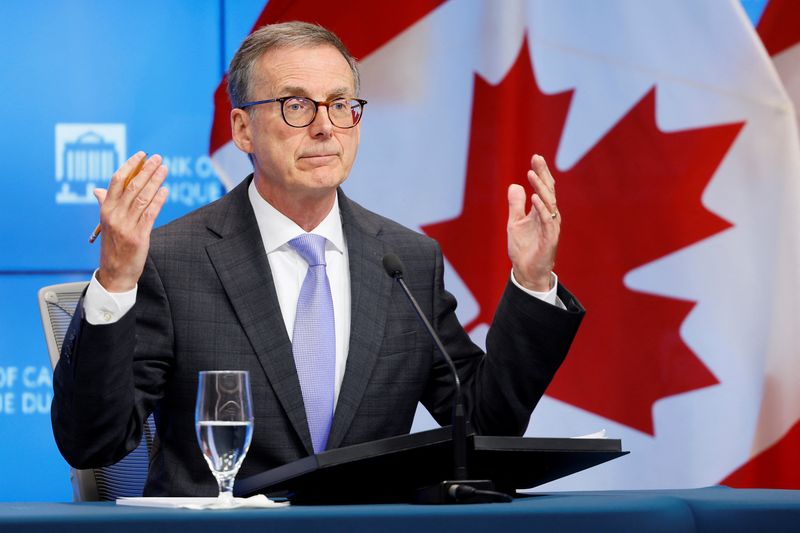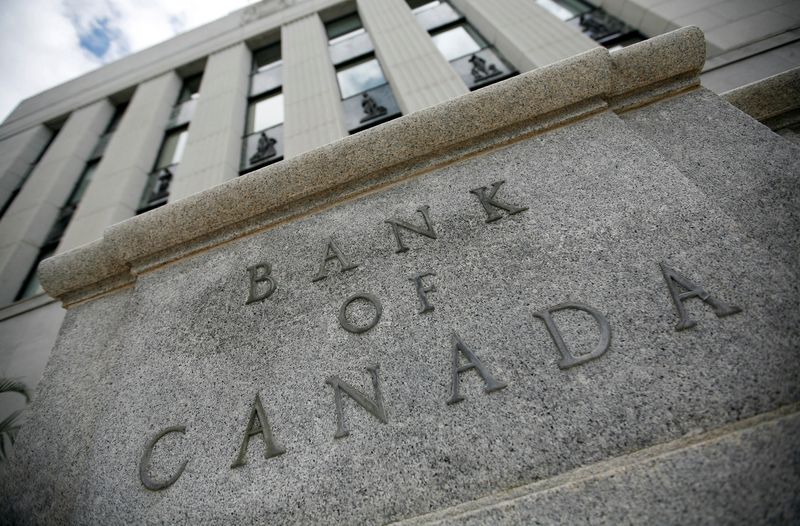By Promit Mukherjee and David Ljunggren
OTTAWA (Reuters) - The Bank of Canada on Wednesday trimmed its key interest rate by 25 basis points for the second month in a row, bringing it to 4.5%, and said more reductions in borrowing costs were likely if inflation continued to cool in line with forecasts.
The central bank had kept its policy rate at a two-decade high of 5% for almost a year in a bid to combat high inflation.
In contrast, the European Central Bank kept rates unchanged last week after it cut them in June.
"We are increasingly confident that the ingredients to bring inflation back to target are in place," Bank of Canada Governor Tiff Macklem told reporters. The BoC reiterated that inflation should return sustainably to its 2% target in the second half of 2025.
The central bank trimmed its 2024 economic growth forecast to a lackluster 1.2% from the 1.5% it predicted in April, in part because households are setting aside more money to pay debts and have less to spend on discretionary items.
"The dovish language in the releases paints a picture of officials who are growing more worried about the likelihood of recession," Royce Mendes, head of macro strategy at Desjardins Group, wrote in a report.
The Canadian dollar weakened further after the rate cut announcement, with the loonie trading down 0.06% to 1.3794 against the U.S. dollar, or 72.5 U.S. cents.
Money markets see a 53% chance that the BoC will cut rates again in its next monetary policy decision on Sept. 4, and are factoring in just one more 25-basis-point cut this year, which would bring the policy rate down to 4.25% by the end of the year.
Macklem said the expected direction of the policy rate was lower, but the bank did not have a pre-determined path.
"It is reasonable to expect further cuts, but the timing is going to depend on incoming data. And importantly, what that data tells us about where inflation is heading," he said.
GROWTH CONCERNS
Downside risks to inflation are taking on increased weight in monetary policy deliberations, Macklem told reporters.
Inflation is facing two opposing forces - a weak economy pulling it down and persistently high prices of shelter and services keeping it up.
"The risk that inflation comes in higher than expected has to be increasingly balanced against the risk that the economy and inflation could be weaker than expected," Macklem said.
The rise in consumer prices slackened to an annual 2.7% in June, with the central bank's closely tracked core measures of inflation also easing marginally.
Economists expressed concerns about the prospect of weaker economic growth in the coming months, reiterating that a slowdown could trigger more rate cuts.
"The Bank of Canada does seem to move into some of the weaker facets of the economy," said Andrew Kelvin, head of Canadian and global rates strategy at TD (TSX:TD) Securities.
Kelvin expects another 50 basis points of rate cuts this year.
In its quarterly Monetary Policy Report (MPR) released on Wednesday, the central bank projected overall inflation would be 2.6% this year and 2.4% in 2025.
Annualized growth was just 1.7% in the first quarter, well below the central bank's forecast of 2.8% in April.
The BoC said growth would increase in the second half of 2024, led by stronger exports and a recovery in household spending as borrowing costs ease.
"With the economy strengthening, excess supply will be absorbed next year and into 2026," Macklem said.

The BoC said it expected growth to be 2.1% in 2025, down from its forecast of 2.2% in April. It expects growth of 2.6% in 2026.
Asked whether the central bank should have started cutting rates sooner, Macklem said he was comfortable with where rates are.
